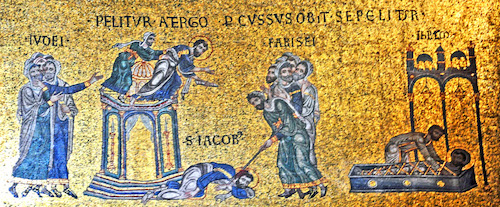
Much early Christian literature, the so-called “apocrypha” of the New Testament, are collections of Christian folktales and sermonettes that are meant to make connections between the Old Testament and the experiences of the early Christian communities. The audience of these collections were not stupid people; they knew what was an exciting novella based on the experiences of the martyrs and what were the scenes made up to fill in the gaps of the story.
One example of such “midrash,” the homiletic-style of telling a Bible story with commentary included, is the Protoevangelium of James which tells the stories of the birth and childhood of the Virgin Mary and Jesus. The Protoevangelium is said to have been written by the Apostle James, the author of the epistle with his name in the New Testament. James was the step-brother of Jesus; he was the youngest son of St. Joseph, who was an older man who had been married before. The stories in the Protoevangelium make explicit what the New Testament implies and underscore-reiterate what the Gospels tells us of Christ.
The Protoevangelium was written approx. AD 150 but incorporates much older material, including the memories of the Jerusalem community of Christians. Long thought by Western scholars to be a complete fiction because of its unusual details, many of these details in the Protoevangelium have been proven correct by recent archeological discoveries (such as the dormitory of a women’s community that lived adjacent to the Temple) and the discovery of other manuscripts that reveal previously unknown 1st century Jewish practices. So, rather than making up fairy tales about Christ and his mother, we now know that the Protoevangelium has preserved long-forgotten details that the original readers would have been familiar with.
Beginning next week, and continuing for the next three-four weeks, we will examine some of the stories in the Protoevangelium about Jesus’ birth and discover what these old stories, meant to supplement the Gospel accounts, can tell us about Christ’s nativity.

I’m looking forward to it!
Polly–Thank you for writing! I’m overwhelmed by the number of people saying the same thing! I never imagined so many people were thirsty for this kind of series.
Stephen
Yes, please! Can’t wait to hear more!
Lesley—Good to hear from you. Let me know what strikes you as the series unfolds.
Thank you for sharing.
Glad to hear from you—Remember us in your prayers, Brother!